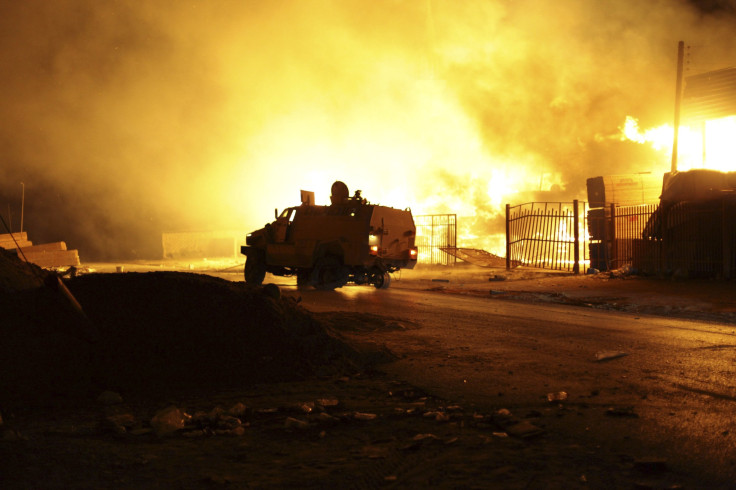Libya Closer To Failed-State Status, Ushering In Possible ISIS, Jihadist Haven

In his speech Wednesday night, President Obama made a commitment to not only fight the Islamic State in Iraq and Syria but also “remain vigilant” as new threats emerge in the Middle East and North Africa. One of those threats may be materializing in Libya, a North African country where a failing government and the advance of radical militias could turn some parts of it into a safe haven and breeding ground for ISIS or other militant entities.
Obama recognized the need for the U.S. to pay more attention to the situation in Libya in a recent interview with the New York Times.
"I think we [and] our European partners underestimated the need to come in full force if you’re going to do this. Then it’s the day after Ghadafi is gone, when everybody is feeling good and everybody is holding up posters saying, ‘Thank you, America,'" he said. "At that moment, there has to be a much more aggressive effort to rebuild societies that didn’t have any civic traditions."
The U.S. led a coalition of Western and Arab nations that helped oust Libyan dictator Moammar Ghadafi with a campaign of airstrikes in 2011. Libya has since fallen prey to growing unrest and disorder. But the U.S. has remained mostly silent on the infighting in the country despite the administration acknowledging that the country needs stabilization.
On Thursday Reuters reported that Islamist militants in Benghazi kidnapped up to 25 soldiers and killed five others when fighters with the Majlis al-Shoura group attacked an army checkpoint, on Tuesday.
The news came after intense fighting between the Libyan military and Islamist militias at Benghazi’s airport. The militants have for weeks been trying to seize the airport after fighters aligned with the Misrata militia seized the airport in Tripoli. Those militants include people who have pledged allegiance to Ansar al-Sharia, which the U.S. designated as a terrorist organization after it was implicated in the attack on its diplomatic compound in Benghazi, which killed the U.S. ambassador to Libya among other Americans. Thursday marked the anniversary of the attack.
Ansar al-Sharia is now thought to have almost total control of Benghazi, though it has faced intense battles with rebels fighting for renegade Gen. Khalifa Hifter, whose goal is to rid the country of Islamic extremists. The battle between Hifter’s forces, the military and Ansar al-Sharia in Benghazi is just an aspect of the infighting currently taking place in the country.
The fighting taking place across the country has pushed more than 100,000 Libyans from their homes and more than 150,000 foreign workers out of the country, the Associated Press reported.
The fighting has also pushed members of parliament out of Tripoli. Libya's new parliament held its first formal session away from the clashes. The parliament, which was elected June 25, traveled to Tobruk, which has been largely quiet, for the session. Libyan leaders announced Thursday that they hope to hold a referendum on a new constitution in December.
Leaders from around the world, including the U.S., expressed their support for the new parliament.
"The governments of France, Italy, Germany, the United Kingdom, and the United States commend the members of the Council of Representatives for beginning their work today," they said in a joint statement. But just a few weeks later, the United Arab Emirates, in cooperation with Egypt, launched airstrikes on Islamist militias, which surprised and angered Washington.
"Libya's challenges are political and violence will not resolve them. Our focus is on the political process there. We believe outside interference exacerbates current divisions and undermines Libya's democratic transition, State Department spokeswoman Jen Psaki said.
Although the U.S. is purportedly preparing to train parts of the Libyan military, it has remained mostly silent on the fighting taking place within the country. Yet in his speech, Obama said that America's new counterterrorism strategy would be broad, and include fighting the terrorists that threaten the U.S.--even those in countries other than Iraq and Syria.
"As Americans, we welcome our responsibility to lead from Europe to Asia—from the far reaches of Africa to war-torn capitals of the Middle East—we stand for justice, for dignity, Obama said. “Abroad, American leadership is the one constant in an uncertain world. It is America that has the capacity and the will to mobilize the world against terrorists.”
While it has not been reported that ISIS exists in Libya, with the government rebuilding itself and Islamist militias vying for power in the east and west, supporters of the Sunni militant group could take form in the country.
“At this moment, the greatest threats come from the Middle East and North Africa, where radical groups exploit grievances for their own gain,” Obama said in his speech Wednesday.
© Copyright IBTimes 2025. All rights reserved.





















